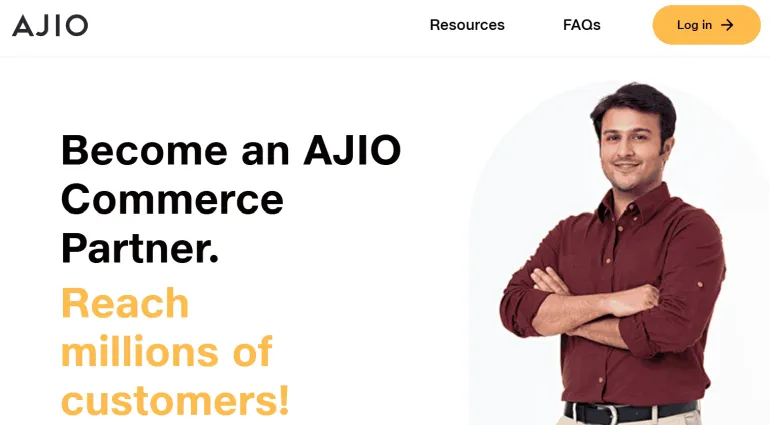How to Register as Seller on Ajio?
“How to Register as a Seller on AJIO” is a common question we receive from eCommerce sellers who use Ginesys OMS (Browntape), a leading eCommerce management platform. AJIO, owned by Reliance Industries, has grown into one of India’s premier fashion and lifestyle marketplaces. Launched in 2016, it faced competition from well-established giants like Jabong and Myntra but has since emerged as a key player in the fashion and lifestyle space. Especially after 2020, AJIO’s growth surged by 4X due to increased online shopping during the pandemic. With over 3.1 million average monthly organic traffic (as per Ahrefs), AJIO is now an important platform for any eCommerce seller in India’s fashion and lifestyle segments.
In this blog, we’ll cover not only the basic steps to register as a seller on AJIO but also dive into key categories, AJIO’s unique business models, and some updated insights that can help you succeed on the platform.
What are the Categories on AJIO?
AJIO.com primarily serves the fashion & lifestyle segment, offering a wide range of products, including those available at Reliance’s offline stores like Trends and Trends Footwear. However, there’s a wide diversity in the type of products you can list on AJIO. Here are the main categories you’ll find on the platform:
- Western Wear
- Ethnic & Festive Wear
- Lingerie & Inner wear
- Footwear
- Winter wear
- Fashion Jewellery
- Kids Wear (Boys, Girls, Baby)
- Toys
- Indie Category: AJIO has a unique "Indie" section, which features handcrafted, artisan-made products sourced from over 500 local artisan vendors. This category celebrates traditional Indian crafts such as Kutch embroidery, Banarasi Brocades, and Kalamkari, making it a great space for artisans looking to reach a larger audience.
- Home & Kitchen: Includes well-known brands like D'Decor, MUJI, Chumbak, and Jaipur Fabric. Sellers offer items like bed linen, cushions, home decor, and carpets.
- World Crafts: Items inspired by global art forms (such as Turkish and Thai designs) but made in India.
The inclusion of artisanal and handcrafted products has become increasingly important as more consumers seek sustainable and unique fashion. As a seller, capitalising on these niche markets can give you an edge.
Updated Business Models on AJIO
AJIO operates on two distinct business models: AJIO B2B (JIT) and AJIO Dropship. Let’s break them down:
1. AJIO B2B / AJIO JIT (Just-In-Time)
This is a purchase order-based model where AJIO acts as an intermediary between sellers and customers. Here’s how it works:
- AJIO collates orders placed by customers and sends them to sellers as back-orders.
- Sellers pack the items in AJIO-branded packaging materials and send them in bulk to AJIO’s warehouses.
- AJIO then sorts the items and ships them to customers.
For sellers, this model involves selling in bulk and ensures that items are dispatched in a streamlined process. You can handle AJIO JIT orders easily if you integrate Ginesys OMS (Browntape), which supports processing daily purchase orders from AJIO.
2. AJIO Dropship
This model gives sellers more autonomy, allowing them to fulfil customer orders directly. Here’s the key difference:
- Sellers receive customer orders directly on the AJIO seller portal.
- You’ll need to pack the items individually using AJIO packaging and send them to an AJIO warehouse.
- AJIO handles final shipping to the customer.
Sellers using Ginesys OMS can manage AJIO Dropship orders alongside other marketplace orders from a unified panel, simplifying order fulfilment.
How to Register as a Seller on AJIO?
Now that you understand AJIO’s business models and categories, let’s explore the step-by-step process of becoming a seller.
Documents Required for AJIO Seller Registration:
- PAN Card
- Aadhar Card
- GST Details
- Current Account Details + Cancelled Cheque
- MSME Certificate (Optional, but highly recommended)
- Company Logo (if any)
- Trademark Certificate (if available, or self-declaration during application)
- CIN & TAN certificates (if your company is a private entity)
Step-by-Step Process:
- Visit the Supplier Registration Portal: Go to https://supplierregistration.ril.com/ to start the process. This portal is a unified registration platform for AJIO, JioMart, and Reliance Digital. You will be registered as a supplier, and the process is uniform across all Reliance eCommerce platforms.
- Complete the Supplier Registration Form: Fill in your personal and business details, including your registered office address, PAN, Aadhar, and GST details.
- Upload Necessary Documents: Ensure you upload all the required documents, including your company’s logo and, if applicable, a trademark certificate or self-declaration.
- Choose Your Product Categories: Make sure you carefully select the product categories relevant to your business.
Tips for Increasing Your Chances of Getting On-Boarded:
- MSME Certificate: A valid MSME (Micro, Small & Medium Enterprises) certificate improves your chances, as it showcases your credibility.
- Website Presence: Having a well-designed website can significantly increase your chances. It shows professionalism and allows the AJIO team to review your products and brand.
- Trademark Registration: If you have your own brand, a trademark certificate helps secure your place as a legitimate brand owner.
After Registration: What’s Next?
Once you submit your application and verify it through OTP, you will be given a request code number to track your registration status. AJIO takes a few weeks to review your application, so be patient.
If Approved:
- Receive Payment Terms: You will be provided with payment terms—typically, you can choose between a 25% commission plan plus logistics fees or a 40% fixed commission plan.
- Log Into AJIO Seller Central: Visit AJIO Seller Central to complete your registration formalities.
- Manage Orders with Ginesys OMS: After registration, you can use Ginesys OMS to handle your AJIO JIT or Dropship orders, simplifying your order management.
FAQs for AJIO Sellers-
1. What is the typical commission structure on AJIO?
AJIO offers two commission plans: a 25% commission + logistics fee or a 40% fixed commission plan. The selection depends on the seller’s product category and sales volume.
2. Can I sell on AJIO if I don’t have a website?
Yes, but having a website significantly enhances your chances of being on-boarded as it showcases your professionalism and product offerings.
3. How long does AJIO take to approve seller applications?
Typically, it takes a few weeks, but this may vary depending on the completeness of your application and the review process.
Key Tools to Simplify AJIO Selling
While selling on AJIO can be profitable, managing multiple orders across different platforms can be challenging. That’s where tools like Ginesys OMS (aka Browntape) come into play. Ginesys helps sellers streamline their operations by integrating various marketplaces (including AJIO) into a single platform. From processing orders to inventory management, it offers comprehensive features to help grow your eCommerce business.
Selling on AJIO is a great opportunity for any fashion, lifestyle, or artisanal seller looking to expand their reach. With categories that range from Western wear to artisanal handloom, AJIO offers something for every type of seller. The platform’s carefully curated approach ensures that only high-quality sellers get on board, so make sure to follow the registration process diligently and showcase the best of your products.
If you are ready to take the plunge and need help managing your AJIO store alongside other online channels, consider using Ginesys OMS. Our platform integrates with AJIO, JioMart, Amazon, and other major eCommerce platforms, helping you manage your business from one place.
Reach out to Ginesys One to learn more!



